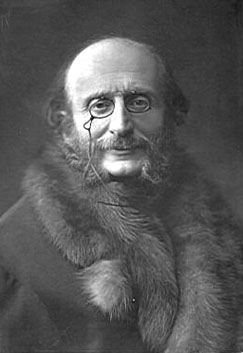Going with this month's operetta theme, this week's piece is also from that interesting (and oft-maligned) genre. It has also become one of the most characteristically French pieces of music ever, as well as the de facto anthem of the Moulin Rouge. It has also been co-opted by Shop Rite for its yearly sale on canned goods ("Now's the time to stock up while the values last," anyone?). Clever leap of logic there, Shop Rite. As is the case with all these pieces, the Galop from Jacques Offenbach's Orpheus In the Underworld is so much more - and so much more bizarre - than it currently represents (though, to be fair, it isn't doing too badly for itself). Even more than that, Jacques Offenbach is definitely a composer who deserves much more recognition than he is given; like Johann Strauss, he was never a particularly "serious" composer, but what he wrote was always delightful (and often wickedly funny) and should be performed far more often than it is these days.
But of course, that may be just me.
 |
| Glasses: not Photoshopped in, apparently. |
In 1849, Jacques was back in Paris, and became the musical director of the Comédie Française that year. He founded a group called the "Théâtre des Bouffes-Parisiens" in the early 1850s, and they often premiered his operettas. Apart from his own works, the Bouffes-Parisiens also staged works by Rossini and Mozart, though always on a small scale - there were government restrictions on licensing performers, so until the laws were repealed in 1858, Offenbach could only put on productions with a handful of actors per piece. In 1858, not coincidentally at all, Offenbach's first large-scale work - Orpheus In the Underworld - was premiered. An incendiary review turned the piece into a controversial work, which then rendered it wildly successful. 1860 saw Offenbach granted full French citizenship, and the 1860s were a comfortable and successful decade for him. The Franco-Prussian war brought about a turn for the worse, however; the French people turned on Napoleon III, and Offenbach's music represented that regime to them. His popularity never waned in Vienna and England during this time, though, and he even embarked on a series of concerts in New York and Philadelphia in 1876. Offenbach was a great musical satirist - he poked fun of Meyerbeer, Berlioz, and Wagner among others, much to the first's amusement (and the second and third's chagrin). And in an example of everyone in the classical music world knowing each other somehow, he was one of the people who convinced a young Johann Strauss to write operettas. Toward the end of his life, he began work on a serious opera, The Tales of Hoffmann, but died in 1880 before its completion. Throughout his career, he wrote over eighty operettas, several ballets, and many other smaller works, all of which show a brilliant wit and a slightly evil sense of humor. The most well-known of these - in a way, of course - is Orpheus In the Underworld, from which our Galop, well, gallops.
 |
| The Can-Can: providing awful puns since 1830. |
The Can-Can music known and loved (or hated) is a dance in Hell by the Gods. Things don't get much better than that. Way to go, Offenbach. Your name may confuse people ("What do you need a Bach with a prefix for?" the naysayers naysay), your nationality may be suspect, and your single claim to fame these days may be used to sell cans, but it takes a rare composer indeed to make that scenario work. Maybe one day we'll pay attention to the rest of your music, too.
Further Listening:
Interested in what Offenbach's idea of 'serious opera' sounded like? (Hint: it's gorgeous.) Try the "Barcarolle" from The Tales of Hoffmann (performed by Anna Netrebko and Elina Garanca): http://www.youtube.com/watch?v=Hdc2zNgJIpY&feature=related
Did you know Offenbach wrote more than one Galop? Yup. And it's right here (from Geneviève de Brabant): http://www.youtube.com/watch?v=f3FOqtdUUUk